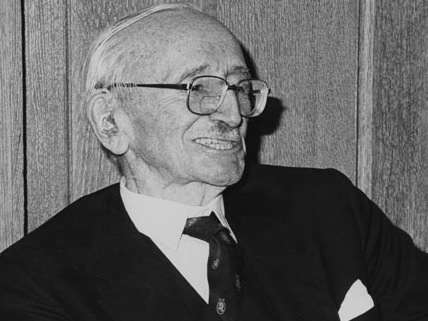45 Years, 45 Days: Hayek for the 21st Century
For 45 days, we'll be celebrating Reason's 45th anniversary by releasing a story a day from the archives—one for each year of the magazine's history. See the full list here.

In 1944, with World War II raging and the fate of the Free World far from clear, Friedrich A. Hayek (1889-1992), one of the great intellectual heroes of reason, published his best-known work. The Road to Serfdom became a bestseller even as it challenged the conventional wisdom that extensive, top-down economic planning would result in a more just and more efficient distribution of goods and services.
To mark the 60th anniversary of the publication of The Road to Serfdom in our January 2005 issue, Reason interviewed Bruce Caldwell, author of Hayek's Challenge: An Intellectual Biography of F.A. Hayek, about the origins of The Road to Serfdom, its continuing relevance, and Hayek's legacy in the 20th century--and in the 21st.
Reason: The Road to Serfdom was published in 1944. How did the book come into being?
Bruce Caldwell: In the 1930s, Hayek was writing articles criticizing the economics of socialism. Most people then saw socialism as the middle way between failed capitalism and totalitarianism of the Soviet and fascist varieties. By the late '30s, Hayek felt that he needed to write a broad-based attack on socialism. In Hayek's Challenge, I mention [sociologist] Karl Mannheim in particular as a figure who argued that planning was the only way to avoid totalitarianism, but everyone was making a similar sort of argument. Hayek turned that on its head and said that extensive planning of the economy was in fact the road to serfdom, to less and less freedom.
He was engaging a widespread belief that socialism was not only more just but more efficient than capitalism, that it was the way to make the world work better. Not just economics should be planned. Science should be planned. Everything should be planned. There was an influential magazine around at the time called Science. Virtually every third or fourth week, they'd run an editorial that said we need to have scientists helping plan all sorts of things. Not just the war effort, but everything about the economy to make it work better. This is what everyone who was "intelligent" thought.


Show Comments (0)